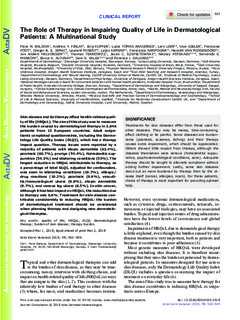The role of therapy in impairing quality of life in dermatological patients: A multinational study
Balieva, Flora Nicol; Finlay, Andrew Y.; Kupfer, Jörg; Aragones, Lucia Tomas; Lien, Lars; Gieler, Uwe; Poot, Francoise; Jemec, Gregor B. E.; Misery, Laurent; Kemeny, Lajos; Sampogna, Francesca; Van Middendorp, Henriet; Halvorsen, Jon Anders; Ternowitz, Thomas; Szepietowski, Jacek C.; Potekaev, Nikolay; Marrón, Servando E.; Altunay, Ilknur K.; Salek, Sam S.; Dalgard, Florence
Peer reviewed, Journal article
Published version

Åpne
Permanent lenke
http://hdl.handle.net/11250/2581574Utgivelsesdato
2018Metadata
Vis full innførselSamlinger
Sammendrag
Skin disease and its therapy affect health-related quality of life (HRQoL). The aim of this study was to measure the burden caused by dermatological therapy in 3,846 patients from 13 European countries. Adult outpatients completed questionnaires, including the Dermatology Life Quality Index (DLQI), which has a therapy impact question. Therapy issues were reported by a majority of patients with atopic dermatitis (63.4%), psoriasis (60.7%), prurigo (54.4%), hidradenitis suppurativa (54.3%) and blistering conditions (53%). The largest reduction in HRQoL attributable to therapy, as a percentage of total DLQI, adjusted for confounders, was seen in blistering conditions (10.7%), allergic/drug reactions (10.2%), psoriasis (9.9%), vasculitis/immunological ulcers (8.8%), atopic dermatitis (8.7%), and venous leg ulcers (8.5%). In skin cancer, although it had less impact on HRQoL, the reduction due to therapy was 6.8%. Treatment for skin disease contributes considerably to reducing HRQoL: the burden of dermatological treatment should be considered when planning therapy and designing new dermatological therapies. The role of therapy in impairing quality of life in dermatological patients: A multinational study